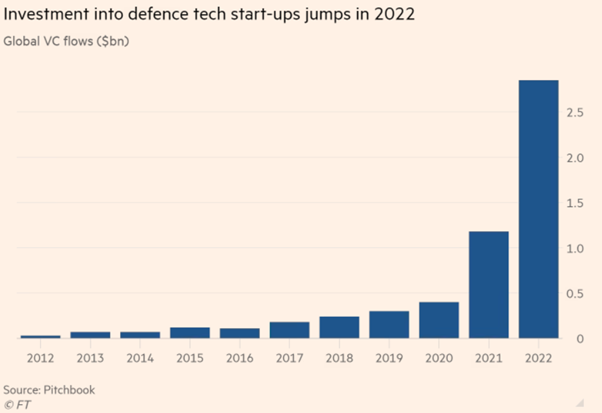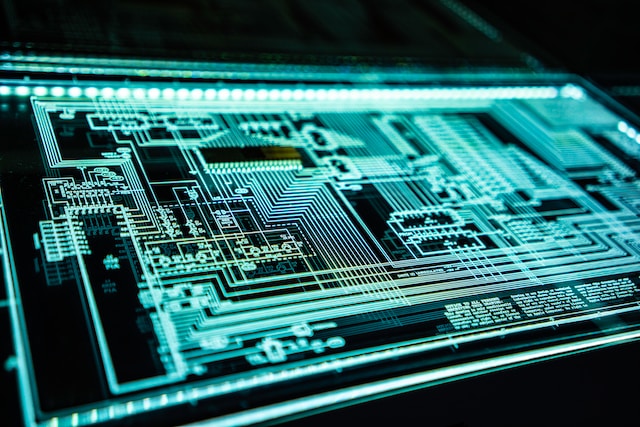Following Russia’s invasion of Ukraine, an unexpected resurgence emerged — Ukraine’s defense technology sector experienced remarkable growth and innovation, generating increased job opportunities and a surge of investments in defense tech startups. According to the survey, investments in defense tech startups grew by almost 2 billion in the year 2022.

Ukraine’s defense tech industry now plays a strategic role on the global stage, but with these opportunities come intricate legal compliance challenges for founders. Each venture is unique, and there’s no universal solution to the complex web of compliance issues in this dynamic, high-stakes sector.
In this article, I explore the diverse challenges founders may confront as they navigate this ever-evolving realm of innovation and security and how they overcome them.
Compliance Challenges Defense Tech And Cybersecurity Companies Face
Here are some of the compliance challenges that defense tech and cybersecurity companies are facing right now.
Complex and Evolving Regulations
The defense technology and cybersecurity sectors are characterized by rapidly evolving threats and technologies. Consequently, regulatory frameworks must adapt just as quickly to address these emerging challenges. Startups in Ukraine must be prepared to not only comply with national regulations but also navigate the intricate web of international and industry-specific rules.
National Security Concerns
One of the paramount challenges for companies operating in these sectors is the profound impact their technologies can have on national security. Governments across the globe have a vested interest in regulating these technologies to safeguard against misuse, unauthorized access, and potential threats. This adds a layer of complexity to compliance, as companies must align their innovations with national security interests.
Export Controls
Many countries impose strict export controls on defense and cybersecurity-related technologies to prevent sensitive information from falling into the wrong hands. Ukrainian companies looking to expand their global reach must grapple with these controls to sell their products and services internationally.
Intellectual Property Concerns
Protecting intellectual property (IP) is a critical consideration for defense tech and cybersecurity companies. However, sharing technology with regulators or complying with specific regulations may necessitate revealing sensitive IP. This creates a delicate balance between protection and compliance.
Data Privacy
In the realm of cybersecurity, handling and safeguarding sensitive data is paramount. Compliance with data privacy laws, such as the General Data Protection Regulation (GDPR) or the Health Insurance Portability and Accountability Act (HIPAA), can be highly intricate, especially for companies with cross-border operations.
Rapid Technological Advancements
The breakneck pace of technological advancement often outpaces regulatory frameworks, leading to uncertainty in compliance. Companies may find themselves in situations where they must align their practices with regulations that weren’t initially designed to address their specific technology.
Global Operations and Third-Party Suppliers
Many defense tech and cybersecurity companies operate on a global scale, which means navigating distinct regulatory environments in each jurisdiction. Additionally, these companies often rely on a network of suppliers and partners, making it essential to ensure that all third parties comply with relevant regulations.
Cyber Threat Landscape
The ever-evolving threat landscape necessitates constant adaptation to stay ahead. Regulatory bodies may introduce new requirements to address emerging threats, and companies must be agile in implementing security measures to remain compliant.
Penalties for Non-Compliance
The consequences of non-compliance in these sectors can be severe. Penalties may include hefty fines, legal actions, reputational damage, and even restrictions on business operations. As such, compliance becomes a high-stakes endeavor.
Interoperability
Defense tech and cybersecurity companies must ensure that their solutions can seamlessly integrate with existing systems and technologies used by government agencies or defense partners. Achieving this while maintaining compliance can be highly complex.
Strategic IP Registration With Legal Compliance In Mind
In this section, we will explore a hypothetical scenario of a Ukrainian startup seeking global expansion. It sheds light on the advantages of registering IP outside Ukraine while emphasizing the critical aspect of legal compliance.
This example illustrates the intricate balance between innovation, international recognition, and adherence to regulatory frameworks that Ukrainian defense tech and cybersecurity companies must navigate in their pursuit of success.
Company situation: A promising Ukrainian cybersecurity startup has developed groundbreaking encryption algorithms and secure communication protocols. While they have gained local recognition, they aspire to establish a strong presence in the international cybersecurity market.
Why registering IP abroad: The company decides to register its IP in a NATO country. They understand that compliance with intellectual property laws is essential to protecting their innovations and avoiding legal disputes in the competitive new market.
How it could help: Registering their IP in a NATO country. not only safeguards their innovations but also makes them an attractive target for Western investors. This strategy allows CyberGuard Innovations to avoid legal complications, gain credibility, and tap into the vast Western market while upholding legal standards.
This example underscores the strategic importance of registering IP abroad for Ukrainian defense tech and cybersecurity companies. Simultaneously, it highlights the significance of maintaining legal compliance to protect innovations and operate seamlessly in international markets.
The Future Of Ukraine’s Defense Technology And Cybersecurity Sectors
In conclusion, Ukraine’s defense technology and cybersecurity sectors have experienced significant growth in the wake of Russia’s invasion, attracting substantial investments and job opportunities. However, with these newfound opportunities comes a complex web of legal compliance challenges that founders must navigate.
From adapting to evolving regulations to addressing national security concerns and ensuring data privacy, Ukrainian companies face a myriad of obstacles in this dynamic industry.
As Ukraine’s defense tech industry continues to play a pivotal role on the global stage, founders and innovators must remain vigilant in their commitment to compliance, ensuring that their groundbreaking technologies not only meet international standards but also contribute to the ongoing security and innovation in this vital sector.
In this ever-evolving realm of innovation and security, the path to success is illuminated by both innovation and unwavering adherence to the rule of law.
Bio
Teti Pudel – IT Lawyer and Advisory Board Member at Slava Venture

